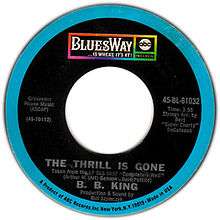The Thrill Is Gone
| "The Thrill Is Gone" | ||||
|---|---|---|---|---|
 | ||||
| Single by B.B. King | ||||
| from the album Completely Well | ||||
| B-side | "You're Mean" | |||
| Released | December 1969 | |||
| Format | 7-inch 45 rpm | |||
| Recorded | June 1969 | |||
| Genre | Blues, R&B, soul blues | |||
| Length | 3:55 | |||
| Label | Bluesway/ABC Records | |||
| Writer(s) | Rick Darnell, Roy Hawkins | |||
| Producer(s) | Bill Szymczyk | |||
| B.B. King singles chronology | ||||
| ||||
"The Thrill Is Gone" is a slow minor-key blues song written by West Coast blues musician Roy Hawkins and Rick Darnell in 1951. Hawkins' recording of the song reached number six in the Billboard R&B chart in 1951.[1] In 1970, "The Thrill Is Gone" became a major hit for B.B. King. Subsequently, many blues and other artists have recorded their interpretations of the song.
B.B. King version
B.B. King recorded his version of "The Thrill Is Gone" in June 1969 for his album Completely Well, released the same year. King's version is a slow twelve-bar blues notated in the key of B minor in 4/4 time.[2] The song's polished production and use of strings marked a departure from both the original song and King's previous material. When released as a single in December 1969, the song became one of the biggest hits of King's career, appearing in the R&B chart at number three and the Billboard Hot 100 pop chart at number fifteen[3] and became one of his signature songs.
B.B. King's recording earned him a Grammy Award for Best Male R&B Vocal Performance in 1970 and a Grammy Hall of Fame award in 1998. King's version of the song was also placed at number 183 on Rolling Stone magazine's list of the 500 greatest songs of all time. Memorable live versions of the song were included on King's albums Live in Cook County Jail (1971), Bobby Bland and B.B. King Together Again...Live (1976), and Live at San Quentin (1991).[4]
Other renditions
"The Thrill Is Gone" has been recorded by numerous artists since B.B. King's hit version,[5] including Aretha Franklin from the album Spirit in the Dark (1970) that was released as a B-side to her single, "Spirit in the Dark", Little Milton from Waiting for Little Milton (1973), Chicken Shack/Stan Webb from Poor Boy (The Deram Years 1972–1974) (1973), Luther Allison from Live in Paris (1979), The Crusaders from Royal Jam (1981), Barbara Mandrell from ...In Black and White (1982), Jerry Garcia and David Grisman from their eponymous album (1991), The Manhattan Transfer from Tonin' (1995), Dishwalla from the soundtrack to Things to Do in Denver When You're Dead (1995), Diamanda Galas on her live album Malediction & Prayer (1998), Willie Nelson from Milk Cow Blues (2000), The Marshall Tucker Band from Stompin' Room Only (2003, recorded from a Volunteer Jam show in 1975), Pappo from Buscando un amor (2003), Leslie West from Got Blooze (2005), and The Eric Steckel Band from Havana (2006). M.C. Hammer's song by the same name from his Feel My Power album samples King's song. Christina Aguilera sang "The Thrill Is Gone" during 2014 New Orleans Jazz & Heritage Festival.
Chart performance
Roy Hawkins version
| Year | Chart | Position |
|---|---|---|
| 1951 | Billboard Rhythm & Blues Singles | 6 |
B.B. King version
| Year | Chart | Position |
|---|---|---|
| 1970 | Billboard Best Selling Soul Singles | 3 |
| Billboard Hot 100 | 15 |
References
- ↑ Whitburn, Joel (1988). Top R&B Singles 1942–1988. Menomonee Falls, Wisconsin: Record Research. p. 184. ISBN 0-89820-068-7.
- ↑ Hal Leonard (1995). "The Thrill Is Gone". The Blues. Milwaukee, Wisconsin: Hal Leonard. p. 220. ISBN 0-79355-259-1.
- ↑ Whitburn 1988, p. 236. Note: Technically speaking, "The Thrill Is Gone," was not the biggest hit of King's career, even if it has come to be known as the song with which he is most identified. "Three O'Clock Blues," released 1951, has the distinction of being his first, and biggest hit. It stayed on the Billboard charts for 17 weeks, and held the number one position for a total of 5 weeks.
- ↑ Greenwald, Matthew. "B.B. King: The Thrill Is Gone – Song Review". AllMusic. Retrieved September 4, 2011.
- ↑ "Roy Hawkins – Songs composed by". AllMusic. Retrieved March 9, 2012.